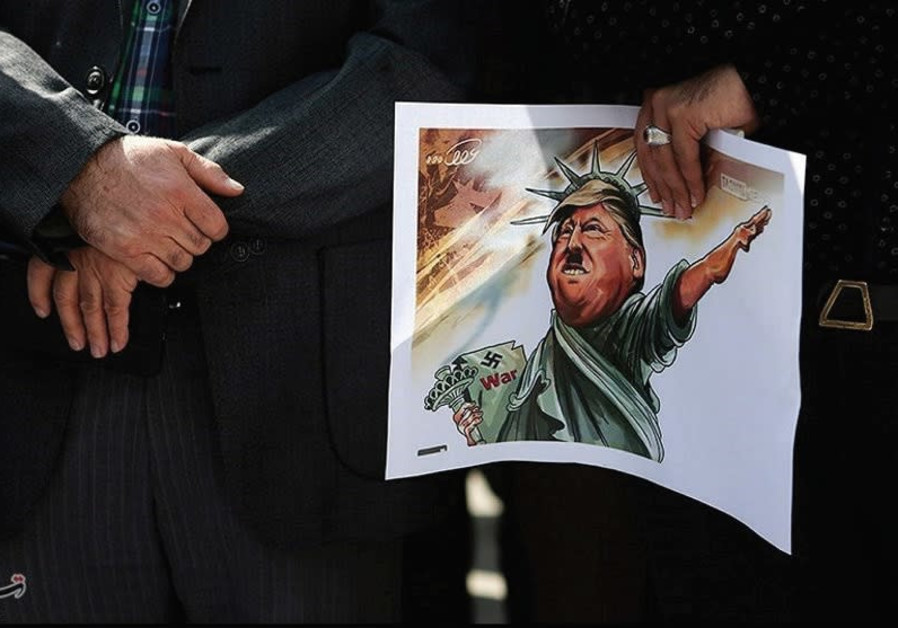U.S., Iran stalemate at U.N. makes conflict more likely – analysis

An Iranian student holds a caricature of US President Donald Trump during a protest against Trump’s latest speech on Iran, in Tehran.. (photo credit: REUTERS)
There was no meeting between US President Donald Trump and Iranian President Hassan Rouhani at the UN.
Not only was there no meeting, but both Trump and Rouhani hardened their positions, especially brushing aside French President Emmanuel Macron’s compromise plan from earlier September which had gotten serious consideration.
With the Islamic republic having blatantly attacked Saudi Arabia’s oil fields in mid-September, broken the 2015 nuclear deal three times over six months and threatening to break the deal more substantially in November, negotiation seems off the table and escalating conflict almost inevitable.
It may even increase the likelihood of an eventual Israeli pre-emptive strike on Iranian nuclear facilities.
Former top IAEA official Olli Heinonen has told the Jerusalem Post that Iran’s November escalation could be more serious than its previous violations of the nuclear deal’s limits.
If Tehran either starts enriching uranium to the 20% level or starts to reactivate around 1,000 or even more IR-2m centrifuges for enriching uranium, its timeline to a bomb could very quickly drop from around a year to closer to six months. The IR-2ms enrich uranium at a much faster rate than Iran’s standard IR-1s.
True, Iran’s violations to date have been minor. But its increasingly aggressive military behavior and the failure of the US to respond firmly, as described by INSS expert Emily Landau to the Post, signal that Iran Supreme leader Ayatollah Ali Khamenei is ready for more brinksmanship and that Trump has yielded the upper-hand to Iran in the standoff.
In some ways, it is extraordinary that the situation did not deteriorate to a larger degree earlier.
Since the US pulled out of the nuclear deal in May 2018, it has battered Tehran’s economy hard, including its ability to fund Hezbollah and other group’s terrorist causes in the region.
The blow to its economy and to its regional hegemony plans (though it has tried to continue even with reduced funds) have shaken the Islamic republic’s stability, even as all signs are that it can ride out the current sanctions with Chinese, Russian and other support until the November 2020 US elections.
An even more immediate escalation might be inevitable if not for Iran having that outside support and its hope that it will be done with Trump in about a year and be greeted by a new US president who will rejoin the nuclear deal and drop the sanctions.
In that sense, neither Trump nor Khamenei actually want an immediate military conflict.
But Trump will not take off the sanctions and Khamenei seems to want to continually raise the nuclear violations and military pressure as much as possible both to improve its leverage for any negotiation and so that Iran can breakout to a nuclear weapon faster if it is unsatisfied with the eventual US election results.
There is still a chance that all of this has been last minute Iran saber-rattling and that it will soon agree to the French compromise of partial temporary sanctions relief (not full) for its temporarily returning to the nuclear deal limits and holding a meeting with Trump.
It seems Trump might agree to this formula over Israeli objections as long as he is not seen as fully retracting sanctions upfront.
But Rouhani on Tuesday conveyed that the absence of trust with Trump means that, unlike North Korea’s Kim Jong-Un, Tehran is unwilling to hold a media-fest summit prior to substantive progress in negotiations.
In some ways this is not surprising as North Korea needed the legitimacy shooting-the-arm from such a meeting, and Iran feels much stronger diplomatically without needing such a meeting.
Also, Khamenei views the US as inherently part of its problems more than Kim.
All of this means that even if neither leader wants the standoff to blow up into a conflict before the November 2020 election, that it could happen anyway.
Iran’s attack on Saudi oil fields crossed new lines and its expected nuclear escalation in November may eventually leave little room for Israel to ignore the military implications of the deteriorating situation even if Trump wishes to use only sanctions.
`; document.getElementById(“linkPremium”).innerHTML = cont; (function (v, i){ });





Comments are closed.